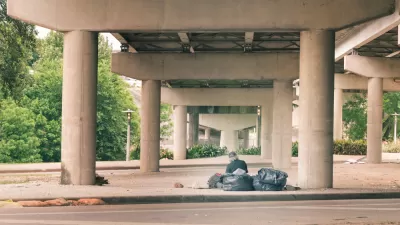Local housing advocates called for a commitment to bring the number of chronically unhoused people to zero.

At a recent town hall hosted by the Coalition for the Homeless of Houston/Harris County, local leaders asserted the potential for Houston to end chronic homelessness, writes John Brannen in The Kinder Institute for Urban Research’s Urban Edge.
According to Central Houston Inc. President and CEO Kris Larson, “This community has housed more than 3,000 people just in the last five years. This is a commitment issue that we need from our elected leadership to recognize that this is something we can do as a community.”
One of the few U.S. cities taking a ‘housing first’ approach to helping unhoused people find stable housing, Houston has been successful in part thanks to strong collaboration between agencies. The city experienced a 61 percent decrease in homelessness in the past 12 years, according to an annual point-in-time count, a success that, says Kinder Institute Director Ruth N. López Turley, shows that homelessness is “not an intractable problem.”
In a survey conducted this summer, housing affordability proved a serious concern for a majority of Houstonians. “Nearly 40% of Houstonians said they were ‘often’ or ‘almost always’ worried about being able to afford their monthly mortgage or rent payment, and about 1 in 4 renters said they were ‘often’ or ‘almost always’ worried about eviction.”
Editor's note: A previous version of this article and the source article quoted Kris Larson as saying "more than 300,000 people." The correct number is 3,000.
FULL STORY: Ending chronic homelessness remains a ‘moonshot’ opportunity for Houston

Trump Administration Could Effectively End Housing Voucher Program
Federal officials are eyeing major cuts to the Section 8 program that helps millions of low-income households pay rent.

Planetizen Federal Action Tracker
A weekly monitor of how Trump’s orders and actions are impacting planners and planning in America.

Ken Jennings Launches Transit Web Series
The Jeopardy champ wants you to ride public transit.

California Invests Additional $5M in Electric School Buses
The state wants to electrify all of its school bus fleets by 2035.

Austin Launches $2M Homelessness Prevention Fund
A new grant program from the city’s Homeless Strategy Office will fund rental assistance and supportive services.

Alabama School Forestry Initiative Brings Trees to Schoolyards
Trees can improve physical and mental health for students and commnity members.
Urban Design for Planners 1: Software Tools
This six-course series explores essential urban design concepts using open source software and equips planners with the tools they need to participate fully in the urban design process.
Planning for Universal Design
Learn the tools for implementing Universal Design in planning regulations.
Ada County Highway District
Clanton & Associates, Inc.
Jessamine County Fiscal Court
Institute for Housing and Urban Development Studies (IHS)
City of Grandview
Harvard GSD Executive Education
Toledo-Lucas County Plan Commissions
Salt Lake City
NYU Wagner Graduate School of Public Service





























